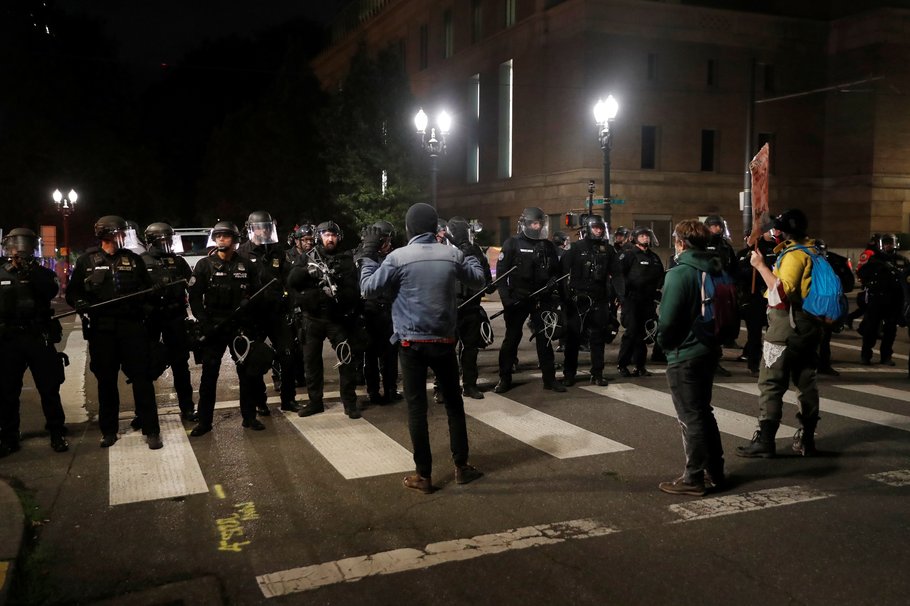Incident details
- Date of incident
- June 15, 2020
- Targets
- Brian Conley (Independent)
- Case number
- 3:20-cv-01035
- Case status
- Settled
- Type of case
- Civil
- Assailant
- Law enforcement
- Was the journalist targeted?
- Yes
Assault

A police line at a June 2020 rally in Portland, Oregon, following the murder of George Floyd. Journalist Brian Conley was documenting a similar protest that month when a police officer launched a flash-bang grenade at him.
Independent journalist Brian Conley was hit by a flash-bang grenade fired by law enforcement in Portland, Oregon, on June 15, 2020, according to a lawsuit filed by a group of journalists who covered protests in Portland that year. The suit, accusing city and federal law enforcement of multiple constitutional violations, was settled in March 2025 for nearly $1 million.
Nightly protests over the death of George Floyd began in Portland on May 29, 2020, part of a wave of demonstrations across the U.S. in response to police violence.
The American Civil Liberties Union of Oregon, representing a group of journalists and legal observers, filed a federal suit on June 28, alleging that law enforcement was assaulting journalists and seizing their equipment at the protests to intimidate them and suppress their reporting.
Conley, who was assaulted multiple times while covering the 2020 protests, joined the suit on July 10. The amended complaint details his experience the night of June 15–16, when, the filing says, he was wearing a “photographer’s vest” and carrying two cameras and a flash.
“He was unmistakably present in a journalistic capacity,” the filing argues, and standing 10 feet away from the protesters outside the Multnomah County Justice Center when he activated the light on his camera. Police then shot him with “one or more flash-bang grenades.”
Later that night, the filing says, police ordered him to disperse, “telling him that it did not matter if he was media,” and charged at him, provoking him to run from them.
After the July filing, the court granted the plaintiffs a preliminary injunction barring the Portland Police Bureau from arresting journalists or seizing their equipment without probable cause, and exempting journalists from dispersal orders.
A similar injunction was later entered against the Department of Homeland Security and U.S. Marshals Service personnel. That order was dissolved in March 2022, when the court ruled that fewer, smaller protests in Portland had reduced the need for it.
The injunction targeting Portland police was also dissolved in May 2023 after the court dismissed some of the plaintiffs’ claims against the city, pointing to changes in state law governing police crowd-control techniques, including limiting the use of tear gas.
The Portland Police Bureau had also updated its directive on responding to lawful demonstrations to include protections similar to those established by the injunction, according to the ACLU.
The settlement reinforces protections through 2028 for journalists who document protests in Portland, the ACLU said. The Portland City Council approved a $938,000 settlement payment to the plaintiffs on March 5, 2025.
Attorney Matthew Borden, whose firm BraunHagey & Borden also represented the journalists, celebrated the protections established by the agreement.
“Freedom of the press is a constitutional check against abuse of government power—one that has become all the more critical in light of the current federal regime,” he said. “Nobody should have to face the nightly storm of violence that our clients braved to capture what actually happened at the 2020 Black Lives Matter protests in Portland.”
The U.S. Press Freedom Tracker catalogs press freedom violations in the United States. Email tips to [email protected].